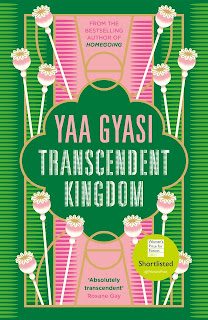Every scientist is a person. They have a unique personality and a unique life story. Their family, friends, education, hopes, romances, cultural background, past disappointments have shaped who they are today. This past has had a significant influence on their current motivation, fears, ability to work with others, confidence, sense of identity, and manner of communication. It is important that we grapple with all this complexity if we are to appreciate and respect others, and to help them be successful. Graduate students are not slaves, robots, or all the same. Graduate students are people.
These complexities are too often overlooked. But we must engage them if we are to personally care for students and colleagues, and relate to them in a manner that helps them be successful. These issues were brought home to me recently reading the novel, Transcendent Kingdom by Yaa Gyasi. I thank my daughter for the gift, particularly as it was not the kind of book that I might normally have sought out.
The main character in the novel is Gifty, a graduate student in neuroscience at Stanford. Her parents immigrated to the U.S.A from Ghana and she grew up in Alabama, just like the author. Gifty's choice of research topic is motivated by her life experience including her brother's struggle with drug addiction. The research described in the novel is actually based on a real scientific paper written by a friend of the author.
Christina K. Kim, Li Ye, Joshua H. Jennings, Nandini Pichamoorthy, Daniel D. Tang, Ai-Chi W.Yoo, Charu Ramakrishnan, Karl Deisseroth
The novel gives an inside view of the life of a graduate student, describes experiments on mice, including the use of fluorescent proteins to image brain activity. Although science and graduate education is not the main point the novel, it may be good to give or recommend to non-scientists that you would like to understand a little of your world. The novel is easy to read and written in beautiful language. The main character (author) is an astute observer of herself, others, and social dynamics. The novel captures some of the intensity, independence, stubbornness, and introversion of a brilliant student.
The narrative naturally engages with a wide range of issues, including the immigrant experience and the associated prejudice, racism, poverty, dislocation, and alienation that are too often encountered. It considers family relationships, particularly the bond and tensions between a mother and an adult child. It gives a picture of what it may be like to be a young woman of colour in an elite institution. Then there is sexuality, white Pentecostal churches in the USA, science and religion, mental illness, drug addiction, a personal face on the opioid crisis, the philosophy of neuroscience, including the mind-brain problem,... This does seem like a long list of issues but the author manages to engage with them in a natural and meaningful way as part of a coherent narrative.
Perhaps the only criticism I might have is that I felt that the ending was a little too quick, neat, and may betray the complexity that the rest of the novel so beautifully captured.
Here are some other reviews and articles about the novel that I found most interesting. A review in the Washington post, A review in The New York Times, The back story of how a visit to a friends lab at Stanford led Gyasi to write the book.





No comments:
Post a Comment